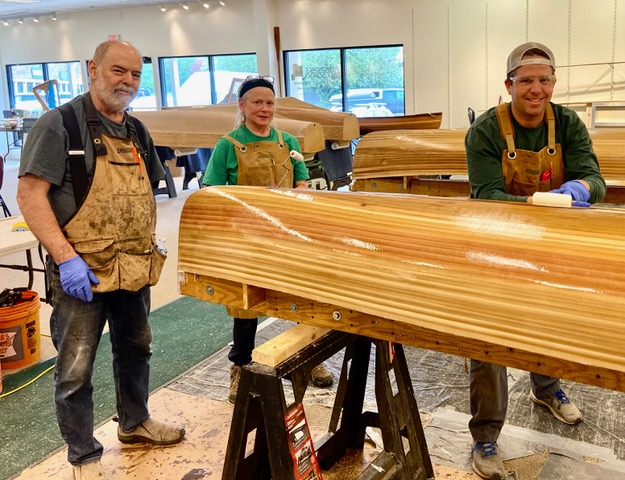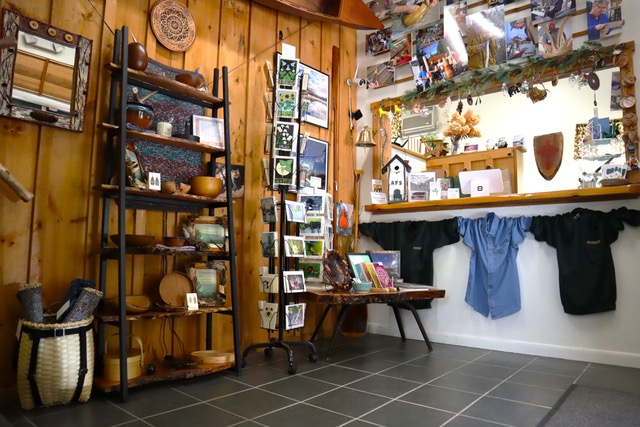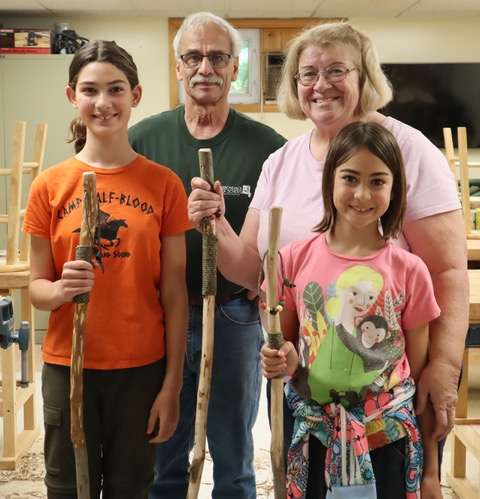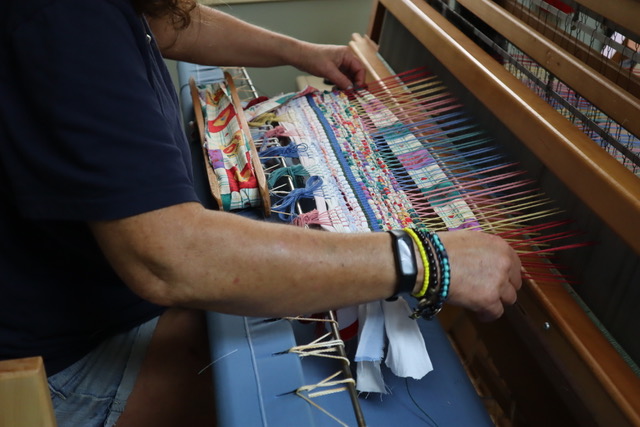Crafting Ingenuity at Adirondack Folk School

In an expansive land rich with natural resources and physical beauty, education and enterprise are given the freedom to flourish.
Traditionally, people living among the Adirondacks’ pristine lakes and thick forests have developed ingenious ways of using what was available to make what they needed. By “making do” they became experts at reinventing and repurposing. Working in concert with their surrounding environment, they crafted unique and useful items by hand, while building a foundation of skills that benefited them and their community.
Since the pandemic, people have been flocking to folk schools around the nation, eager to nurture their creativity, work with their hands, and immerse themselves in an atmosphere that prioritizes relationships, culture, personal growth, and community empowerment.
“People come here and discover their creative passion. They explore and create with their hands and minds, and have fun doing it. By working together, it creates a sense of community. During COVID, people were really feeling that loss, and were spending a lot of time on their computers. That’s when the folk school really blossomed – people wanted to learn new things and be with each other,” said Terri Cerveny, Executive Director of the Adirondack Folk School.
Giving Rural Entrepreneurs a Boost
The Adirondack Folk School, in Lake Luzerne, was founded by Jim Mandle in 2010. Since then, they’ve graduated more than 6,000 alumni. In 2023, their 60 instructors offered 250 classes to approximately 1,000 students. Through a variety of programs, including woodworking, blacksmithing, ceramics, fiber arts, basketry, photography, crafting, and more, the school’s courses build skills, create jobs, and help develop a more diplomatic and just society for rural entrepreneurs.
More than just a flight of fancy for back-to-the-earth enthusiasts and tourists, the Adirondack Folk School plays an important role in the local community’s economic development. By salvaging, harvesting, and purchasing products locally, natural materials like birch bark, branches, and balsam needles are used to create Adirondack-style rustic furniture, décor, and accessories. The slow economics of reuse and upcycling are utilized in courses including quilt-making (where old shirts are repurposed into wonderfully patterned one-of-a-kind quilts), and blacksmithing (where students work to achieve master smith certification using regionally-sourced steel).
By employing instructors and educating artists, the Adirondack Folk School
is ensuring the traditional customs of this region are kept alive while
simultaneously enriching its people’s characteristic practice of sustainable, intentional, resourcefulness.
“Luckily for us, our artisans have devoted their lives to their craft and are willing to teach others, which helps preserve these traditions for future generations,”
said Terri.
Finding ways for these talented teachers to benefit beyond the classroom, three times a year the artists meet, mingle, and form future collaborations at the Adirondack Folk School’s Instructor’s Gathering.
These gatherings help to nurture a pipeline of talent flowing through the school. New workshops for kids (such as gardening, weaving, letterboxing, and birdhouse building) include children as young as six years old. The school is expanding its programming to ensure the next generation will not miss out on their opportunity to experience this unique cultural education, and can potentially pass it on to others in the future.
Falling in Love with Learning
After retiring from a successful career in education administration, Terri Cerveny moved from Schenectady to Lake Luzerne in 2019. Like so many others looking for comradery in a relaxing environment, she took a class. In addition to meeting new people, she was also able to find her passion – jewelry making.
“I just fell in love. I fell in love with the location, the people, the school,” she said.
Last year, Terri became the folk school’s Executive Director, a job she was happy to take on because since the Adirondack Folk School isn’t an accredited college (like other institutions she’s be a part of), they have the freedom to include an astonishingly vibrant range of instructors and courses within their curriculum.
“The exceptional people here care deeply about the school and want to preserve their art, hone their skills and crafts, and share them with others. It’s really a beautiful thing, and I get to be a part of that,” she said.



Taking it Up a Notch
The Adirondack Folk School’s eclectic selection of courses includes opportunities to learn about the lifestyles and crafting traditions of the Eastern Woodlands’ Native Americans, and the clever homesteading hacks European settlers employed in this area three centuries ago. Through the Adirondack Folk School’s partnership with the Thunderhawk Living History School, students learn traditional beading, moccasin-making, or can choose to go on the overnight camping trip of a lifetime, immersing themselves in the lives of those who lived there in the 1700’s. They enjoy storytelling and drumming around the fire, with reenactors dressed in historically accurate attire.
Because of the public’s surge in interest since the pandemic, the Adirondack Folk School expanded to an annex in Lake George’s Route 9 outlet mall. The Alfred Z. Solomon Weaving and Woodworking Studio houses their exceptional 11 day cedar strip canoe-making class, and more than a dozen looms in a variety of sizes.
Currently in the beginning stages of a Capital Campaign that will allow them to expand their facilities and bring these activities back to their Lake Luzerne campus, the school, a 501c3 non-profit organization, has already raised more than $300,000 in cash and pledges toward their new building project.
“I’m very excited about the momentum we’re building. Our enrollment has been growing steadily since the pandemic. People continue to want to learn how to create things that can make them more self-reliant and to do so in a safe, welcoming community with others who have similar interests. We are running out of space to accommodate this growing demand. The time is now for us to expand,” said Terri.
Visit the Adirondack Folk School’s Summer Festival, July 27th, 10 a.m. to 4 p.m. for FREE family fun featuring craft demonstrations, storytelling, music, food, and magic.
Course gift certificates and finished pieces by mostly regional artists, students, and instructors are available in the Adirondack Folk School gift shop. Get something special for the ones you love at their remarkable Holiday Sale, November 16th, 10 a.m. to 3 p.m. For updates, follow them on Facebook @ADKFolkSchool, on Instagram @ adk_folk_school, and go to adirondackfolkschool.org